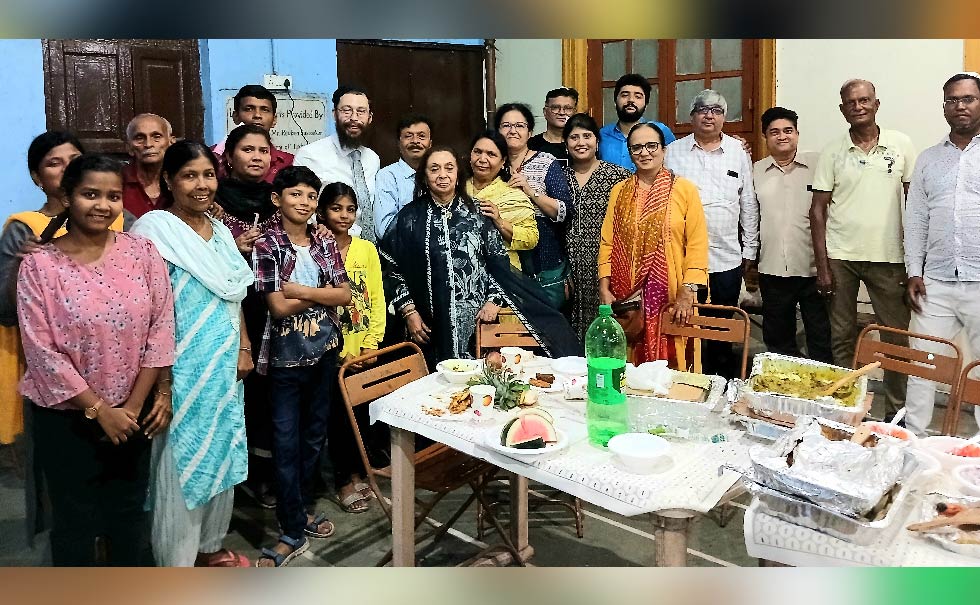Parshat Yitro
ShalomU’Vracha,
The history of the Children of Israel is replete with examples of righteous converts, throughout the Tanach we hear of; Batya the daughter of Pharoah, Rahab the harlot who sheltered the spies of Ye’hosha, and Obadiah the Edomiteconvert and prophet.
In our Rabbinical works, such as the Talmud we also have famous and influential converts such as Shemayah and Avtalyonand Ben Bag Bag and Ben Hay Hay.
The examples of their individual righteous acts and unique personalities of the converts above are elaborated upon in great detail in the Midrash.
Beyond this, many scholars and leaders of our people following the close of ancient tradition has also been Ger Tzedek (righteous converts), scholars like Onkelos and others stand out as exemplary scholars and leaders of our people.
In our Parsha of Yitro, we are introduced to the first convert to the Jewish people, Yitro arrives shortly after the splitting of the sea and the encounter with the nation of Amalek. Yitro arrives not only to reunite Zipporah and their two sons to Moshe after he sent them away but also because he had “heard” about the destruction of Egypt and the great wonders done for the Children of Israel – seemingly in Rabbinical writings the victory against the theology of Egypt and the destruction of the various idols that also occurred during the plagues was seen by Yitro as further theological proof in Hashem.
Yitro is an enigmatic character in the Tanach and as Moses’ father inlaw he carries immediate significance, however from our reading of the Tanach little is known about him at all.
In the Mechilta on the Parsha, it collects the various Midrashimthat mention the various names the Torah gives to Yitro:
Yeter
From the Hebrew root of “addition”, because of the judicial system that he instructed to Moses which was accepted as an essential element of the Torah.
Yitro-Jethro
Which has a similar meaning; however, this name signifies that he did many Mitzvot and righteous deeds.
Ch’ovav
From the root word meaning “love” or “favor” because he was loved by Hashem.
Re’uail
Which could be broken up to “Re’iah,” meaning friend or companion, and “A-il,” meaning G‑d.
Chever
As he was as a “friend” of Hashem.
Putiel
The first half of the word [פוטי] has a root that indicates redemption because Hashem had redeemed him from his idol worship and theological confusion.
Keini
Based on the root word that means “to acquire” because he acquired Torah.
According to the Midrash (Midrash-Aggadah, Shemot 2:16), Yitro had experimented with all of the religions available to him until he had acquired the religious and political status as the High Priest of Midian, it is possible that each of the names represents a Tikkun or correction for each of the religions that previously he belonged to.
The Midrash here goes on to explain that following his acceptance of the Torah, rather than the journey with the Children of Israel himself through the desert to the land of Israel, he chose to return to Midian to help convert his native people to Israelite monotheism.
An interesting question is classically asked on the Parsha:
Yitro arrived to visit Moses as a guest and honored dignitary,
Why didn’t Aharon and the elders make a meal and invite him to a meal – why did Yitro invite them?
Although not explicitly indicated in the text of the Parsha we know from our tradition that in addition to bringing sacrifices and converting in terms of religion, he also undertook a Brit Mila, circumcision and was required to make a meal to celebrate; the Sudat HaBrit – hence he invited them.
A nice Remes or hint for this requirement for the meal is found in the Pasuk in Shemot 12:
משתה יעשה לכל הקהל
“A meal should be made for all those assembled/the entire community”
In this verse, the first letters of each word spell מילה another term of “Circumcision.”
(שער בת רבים)
My wife and I have had the unbelievable privilege of being connected with hundreds of individuals who have undertaken Halachic Conversion, from a variety of countries and backgrounds.
My wife continues to teach at Machon Ora and we often have the delight over the years of hosting the students for Shabbat and Yom Tov meals as well as meeting individually for guidance and counseling – it has been our further joy to continue to be connected as these students go on to marriage, children and even to advanced Torah study and community positions.
We have heard stories ranging from miraculous to those that are truly sad and reveal an abuse of power over those seeking to join the Children of Israel:
This mistreatment of those most at risk of being victimized by the system can cause the exile of the entire people as the Prophet Zechariah (chapter 6) relates:
(And the word of the LORD to Zechariah continued:)
כֹּ֥ה אָמַ֛ר יְהוָ֥ה צְבָא֖וֹתלֵאמֹ֑ר מִשְׁפַּ֤ט אֱמֶת֙ שְׁפֹ֔טוּ וְחֶ֣סֶד וְרַֽחֲמִ֔ים עֲשׂ֖וּ אִ֥ישׁאֶת־אָחִֽיו׃
Thus said the LORD of Hosts: Execute true justice; deal loyally and compassionately with one another.
וְאַלְמָנָ֧ה וְיָת֛וֹם גֵּ֥ר וְעָנִ֖יאַֽל־תַּעֲשֹׁ֑קוּ וְרָעַת֙ אִ֣ישׁ אָחִ֔יו אַֽל־תַּחְשְׁב֖וּ בִּלְבַבְכֶֽם׃
Do not defraud the widow, the orphan, the stranger, and the poor; and do not plot evil against one another.
וַיְמָאֲנ֣וּ לְהַקְשִׁ֔יבוַיִּתְּנ֥וּ כָתֵ֖ף סֹרָ֑רֶת וְאָזְנֵיהֶ֖ם הִכְבִּ֥ידוּ מִשְּׁמֽוֹעַ׃
But they refused to pay heed. They presented a balky back and turned a deaf ear.
וְלִבָּ֞ם שָׂ֣מוּ שָׁמִ֗ירמִ֠שְּׁמוֹעַ אֶת־הַתּוֹרָ֤ה וְאֶת־הַדְּבָרִים֙ אֲשֶׁ֨ר שָׁלַ֜ח יְהוָ֤הצְבָאוֹת֙ בְּרוּח֔וֹ בְּיַ֖ד הַנְּבִיאִ֣ים הָרִֽאשֹׁנִ֑ים וַֽיְהִי֙ קֶ֣צֶףגָּד֔וֹל מֵאֵ֖ת יְהוָ֥ה צְבָאֽוֹת׃
They hardened their hearts like adamant against heeding the instruction and admonition that the LORD of Hosts sent to them by His Spirit through the earlier prophets, and terrible wrath issued from the LORD of Hosts.
וַיְהִ֥י כַאֲשֶׁר־קָרָ֖א וְלֹ֣אשָׁמֵ֑עוּ כֵּ֤ן יִקְרְאוּ֙ וְלֹ֣א אֶשְׁמָ֔ע אָמַ֖ר יְהוָ֥ה צְבָאֽוֹת׃
Even as He called and they would not listen, “So,” said the LORD of Hosts, “let them call and I will not listen.”
וְאֵ֣סָעֲרֵ֗ם עַ֤ל כָּל־הַגּוֹיִם֙אֲשֶׁ֣ר לֹֽא־יְדָע֔וּם וְהָאָ֙רֶץ֙ נָשַׁ֣מָּה אַֽחֲרֵיהֶ֔ם מֵֽעֹבֵ֖ר וּמִשָּׁ֑בוַיָּשִׂ֥ימוּ אֶֽרֶץ־חֶמְדָּ֖ה לְשַׁמָּֽה׃ (פ)
I dispersed them among all those nations which they had not known, and the land was left behind them desolate, without any who came and went. They caused a delightful land to be turned into desolation.
(Translation courtesy of Sefaria.com)
In South Africa, we met with Rabbi David Benchlouch who at the time was the spiritual leader of the Cape Town Sephardic Community who married my wife and I in his beautiful synagogue;
through that connection, I was introduced to the teachings of HaRav Yaakov Peretsin Jerusalem at Midrash Sephardi in the old city where I would eventually study myself, amongst the Sefarim I first saw was his small but powerful guidelines for conversion:
I was struck by the immediate simplicity of the actual Psakim and the warmth and kindness that was present in the introductions and conclusions of the work.
Within this monumental set of laws and criteria, he further writes about the potential abuse of power prevalent in some places, I was able to study his Seferand speak to him directly about a range of issues and questions ranging from the actual process of conversion to modern applications such as non-surgical circumcision for those unable to undertake the minor surgery in adulthood.
His position is based largely on Rishonim and we discussed the changes of attitudes towards conversion, largely based on Christian persecution and other community-specific issues to which a general direction and approach towards the subject undertook a significant evolution towards discouragement – thankfully due to wonderful scholars such as Rabbi Yonaton Halevy more of Rabbi Perets’s Halachicwritings are now becoming available for the first time to the English speaking public and hopefully, more students of Halacha will have access to this clarity of thought and legal vision.
May we see the ingathering of the Children of Israel, from every corner of the globe and every background – may the righteous converts to Israel lend us their understanding and unique cultural perspective to complete us as a people, much in the same way as the timeless lessons of Yitro have become part of our Torah.
Rabbi Jonathan Goldschmidt 2021 ©




